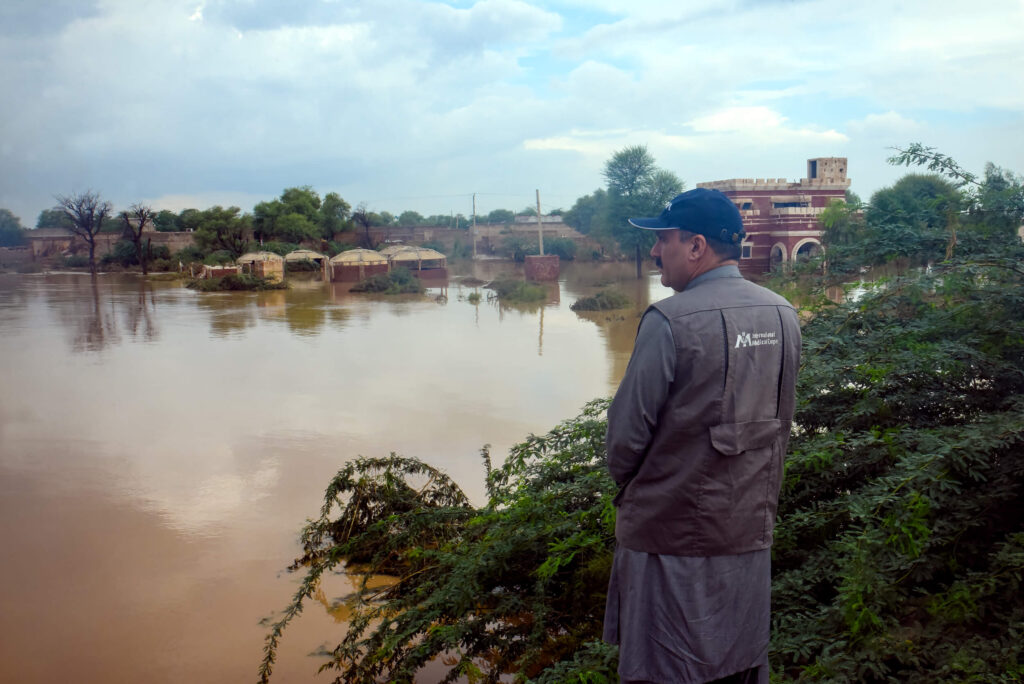
We are responding to
Flooding in Pakistan
An extreme monsoon season is affecting communities throughout Pakistan, with multiple weeks of heavy rainfall causing widespread flooding and landslides. Some 33 million people have so far been affected—with more than 1,600 people killed and more than 2 million homes damaged or destroyed—in what local officials are calling a “climate catastrophe.”
The situation is expected to worsen, as more rainfall is forecast for the coming weeks. Along with loss of human life, there has been widespread loss of livestock, and extensive damage to roads, bridges and other infrastructure, making everyday life incredibly difficult. In addition, given contamination of water systems by floodwaters and lack of access to clean drinking water, authorities expect water-borne diseases, respiratory tract infections, skin infections and malaria to rise—while significant infrastructure damage (including more than 1,460 health facilities) and displacement are limiting access to health services.
Shelter, food, health, and water, sanitation and hygiene (WASH) have been identified as priority needs. With a history in Pakistan that reaches back to 1985, International Medical Corps is responding by providing medical services and supplies, as well as mental health and WASH services, to women, children and men affected by the flooding.
You can help rebuild devastated lives
Your donation can help International Medical Corps provide care to women, children and men affected by the floods.
Donate nowOur Response
International Medical Corps is supporting the Department of Health in Khyber Pakhtunkhwa and Sindh provinces by providing essential medicines and medical supplies to treat acute watery diarrhea, cholera, malaria, acute respiratory infections, and skin and eye infections. We also are providing water purification tablets in highly affected districts of Khyber Pakhtunkhwa.
These emergency essential medical items in Khyber Pakhtunkhwa are sufficient for at least 4,500 patients for a period of around 30 to 40 days, and in Sindh for 6,200 patients for 30 days.
We also have distributed 10,000 water purification tablets to district health officials in in Dera Ismail Khan and Tank districts, Khyber Pakhtunkhwa province, and distributed 20,000 water purification tablets to district health officials in Jamshoro and Dadu districts, Sindh province. In addition, we are arranging for 20,000 water purification tablets and essential medical items to be distributed to about 6,200 patients in Khyber Pakhtunkhwa.
International Medical Corps has worked in Pakistan since 1985, when we began training young Afghan refugees to return to their home communities inside Afghanistan and provide basic healthcare in places that medical professionals had fled following the 1979 Soviet invasion.
In 1999, we extended our training to the Afghan refugee population living in what was then Pakistan’s Northwest Frontier province, an area since renamed Khyber Pakhtunkhwa province, where we continue to provide services. And we have extensive experience with emergency response: when a massive earthquake struck the region in 2005, claiming more than 70,000 lives, our medical response teams were among the first on the scene, treating survivors within 12 hours.
Since then, we have responded to every other major natural disaster in the country, including monsoon flooding and earthquakes, as well as assisting people affected by conflict and by the COVID-19 pandemic. We will continue to provide aid to women, children and men whose lives have been devastated by this flooding. You can help. Click the button below to support our work in Pakistan.
Photo Gallery





International Medical Corps staff members assess needs in Dera Ismail Khan, Khyber Pakhtunkhwa, Pakistan.
International Medical Corps staff offer emergency medical assistance to residents in Dera Ismail Khan, Khyber Pakhtunkhwa, Pakistan
International Medical Corps staff unload medicines and medical equipment at the Expanded Programme for Immunization office in Dera Ismail Khan.
International Medical Corps staff offer emergency medical assistance to residents in Dera Ismail Khan, Khyber Pakhtunkhwa, Pakistan
International Medical Corps staff offer emergency medical assistance to residents in Dera Ismail Khan, Khyber Pakhtunkhwa, Pakistan.